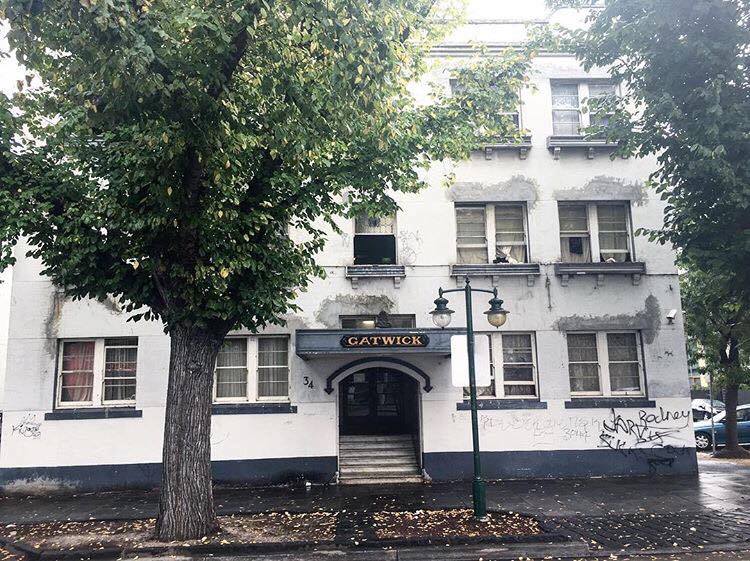Words and Photos by Brigid Cooley
Yvette Kelly is rummaging through a plastic folder of clippings she has collected throughout her forty-six years at the Gatwick. There are old features heralding her work, and recent sensationalist tabloids dubbing the business she has dedicated her life to – ‘a hotbed of villainy’.
“They called us the Saints of St Kilda” she muses, “they wrote some really lovely things. And then in the last three or four years it’s turned around”.
Yvette, along with her sister Rose Banks, is co-owner of The Gatwick Private Hotel on Fitzroy Street, St Kilda. Originally owned by their Maltese mother Vittoria Carbone, Yvette started working there at just fourteen, after her mother acquired the boarding house. When their mother died in 1998, Yvette and Rose have run it since.
The Gatwick has a certain notoriety. Since the 1950s, it has been called a place of last resort – housing the addicted, mentally ill, paroled or otherwise ‘fringe’ demographic of Melbourne society. Outside, it has somewhat of a stereotypically spooky appearance, a battered heritage listed 1930s mansion sitting in prime Melbourne real-estate. Inside, there is a strong odour of cigarette smoke. Its interior is dark oak, covered in faded red and gold carpet – remnants of a grander bygone era. The foyer is dominated by an impressive staircase, a poky reception. A picture on the reception door reads “Caution: Maltese bites”.
In this reception, I sat down with Yvette to talk about why they made the recent decision to finally close.
“It’s the pressure from the media, the police and shop traders” she says, “it’s hard to describe, because you think you are doing the right thing by housing these people, and the tenants appreciate it. With the gentrification of St Kilda, no one likes to look at the slightly marginalised people.”
Vincent Cooper, general manager at the Tolarno Hotel, is one such shop trader. He claims that disturbances from the Gatwick are causing the street to suffer.
“It will have a substantial impact for the street in the right direction” he says. “There will always be a side of politics that will cry foul, you know ‘oh this is terrible, those poor homeless people…’. The next big thing is to get the soup kitchen removed from the area.”
Yvette isn’t surprised by his comments, though she believes the blame the Gatwick receives is unfair.
“There are a lot of shops closed on Fitzroy Street, but that’s the state of retail. Its downfall is the lump of concrete in the middle (a divider making U-turns impossible). That’s killed Fitzroy Street, because that never used to be there. They’re using the Gatwick as a scapegoat.”
At Healthtime, an afternoon tea in the Gatwick’s kitchen, I meet Peter Andrews from St Kilda Community Housing. He tells me the organisation is committed to rehousing the Gatwick’s residents in the four months before closure. This will not be an easy task – the public housing waiting list has skyrocketed to over 33,000, and there are limited alternatives.
“St Kilda has been gentrified” he says. “The community housing sector has moved from boarding-house-style accommodation to more self-contained. From a homeless perspective, it has issues. Suddenly, you’re losing stock levels, there are seventy odd rooms here that won’t be used, there will be less options.”
Angela*, is an ex-resident. Homeless for 10 years, she lived at the Gatwick for six years and credits the sisters for arranging her public housing.
“This place had facilities and support services that came to the building” she says, “it’s very hard to find that elsewhere. A lot of the residents have their public housing forms and are waiting to be contacted, once they move out there’ll be no way to contact them. It’s very sad for them.”
But for short term tenants like Jessica*, the future is uncertain. She describes her lifestyle as “transient” and has been staying at the Gatwick on and off.
“I have no idea where I’m going to go, no one has contacted me” she says. “I’m worried. The thing about the Gatwick is, it’s like my home”.
Crime was a focal point in the call for the Gatwick’s closure. St Kilda Police have stated they receive on average five call outs a day here, irrespective of several high-profile murders, including that of Simon Gurfinkel in 2005 and Arthur Karatasios in 2006.
Yvette is wary of comments made by the police.
“Our closure won’t have any effect on crime, I think it will make it so much worse. It will be dispersed, it will be on everybody’s front door step.”
“They (the police) tell me it’s run really badly and I don’t know what I’m doing. Well I’ve been doing this for 46 years; how can they tell me that when they haven’t done it for a day? We do everything they ask of us and try to make everybody happy, but nobody’s happy.”
St Kilda Police declined my request to comment.
The possibility of the Gatwick’s sale to Channel 9 for the next season of ‘The Block’ was one ironic issue that came out of the closure. Yvette reiterates there are multiple parties still interested, indeed she is interrupted mid-interview to give a tour to a prospective buyer.
Nevertheless, on March 22nd 2017, Channel 9 confirmed their purchase of the building.
John*, a former resident who now works part time at the Gatwick, is worried about the future homeless of Melbourne.
“These ladies brought me out of the gutter and gave me a roof over my head, that’s gonna be gone for the next generation that falls on hard times”.
Towards the end, a teary Yvette cannot imagine her life beyond the Gatwick.
“I have no idea what I’ll do, I’m too old to learn anything else. Maybe I’ll be a brain surgeon,” she laughs.
“I do love the Gatwick though, it was always my soul.”
*Names have been changed.



